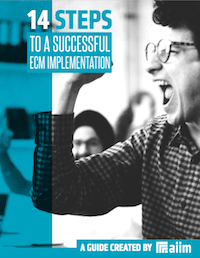The AIIM Blog
Keep your finger on the pulse of Intelligent Information Management with industry news, trends, and best practices.
Capture and Imaging | Enterprise Content Management (ECM)
What exactly does it mean to have an “open platform”? The perception is that an open platform has no restrictions or limitations; an open platform is agnostic. Yet reality is that there could be some limitations or restrictions. For example, there are ECM solutions that are built upon a proprietary database and are still considered to be “open”. The reason being they support a specific set of open standards for interoperability and integration. While the concept is sound, and many businesses look to a day where interoperability and integration across the enterprise is achieved, AIIM research finds that only 8% of organizations have accomplished this.
Share
AIIM Conference | Analytics | Enterprise Content Management (ECM)
AIIM19 is coming soon to San Diego on March 26-28 and as usual the gathering will be the place to be for information management professionals. If you plan on attending you should mark your calendar for an important roundtable session called “When You Are in the Storm: Content Analytics & ECM Implementation Across the Enterprise” being hosted by John Daly, Information Governance Manager the Metropolitan Sewer District in St. Louis. I asked John to give us a small preview of the session.
Share

Making an ECM implementation successful requires planning and attention to detail. The best way to create the right solution is to identify organizational goals and priorities. Learn how to manage a successful implementation in our free guide.
Automation | Business Process Management (BPM) | Enterprise Content Management (ECM)
Information is cascading down upon every organization in unprecedented volumes and forms, challenging traditional and manual concepts of records management and information stewardship. This information tsunami is happening at the very time that the process value of these digital assets is more mission-critical than ever.
Share
CRM | Enterprise Content Management (ECM)
Every organization wants to increase agility and productivity by extracting maximum value from its processes and content. Organizations need to bridge the silos created by disparate lead applications to seamlessly pull structured and unstructured information together and present the whole story to the customer relationship management (CRM) users who need it. Easy access to documents and content is a key requirement in fully leveraging a CRM system. 95% of CRM users want easy access to the latest version of their files and documents, and 55% of CRM customers see “ease of use” as the most important feature.
Share
Enterprise Content Management (ECM) | Enterprise Resource Planning (ERP)
Are your Human Resources processes intelligent? Before you try and answer that, let me explain more about what I mean. This idea of intelligent processes stems from an evolving set of capabilities that transform the way we manage information into something smarter and more connected than ever before. AIIM calls this Intelligent Information Management - and we believe it has the power to revamp your business processes, including Human Capital Management (HCM).
Share
Enterprise Content Management (ECM)
Enterprise Content Management (ECM) is a systematic approach to capture, manage, store, preserve, and deliver information related to business processes. So if it is related to business processes, especially to core business processes, it must be considered key for any organization.
Share